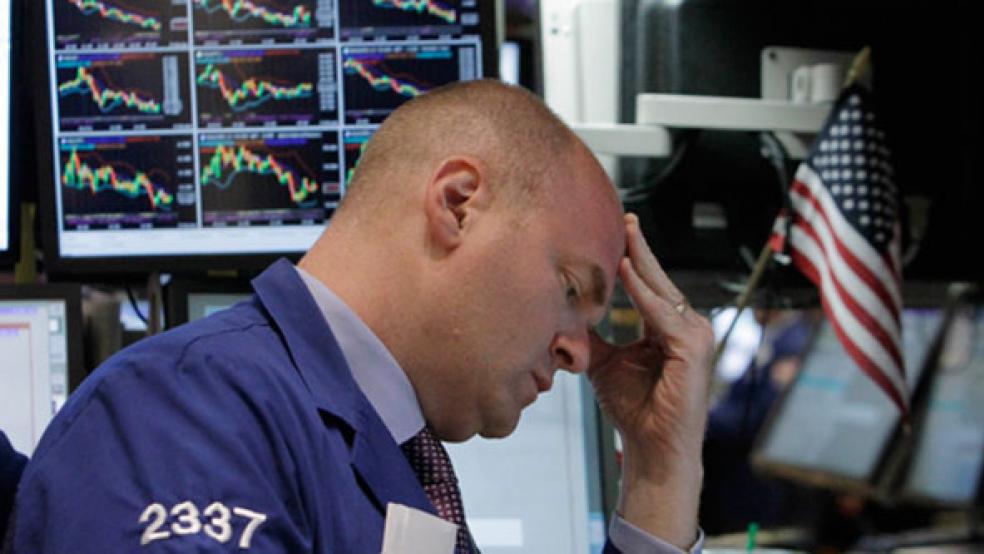The latest employment numbers out this morning are further evidence of slowing growth in the U.S. economy, sparking concern among investors, market analysts and economists who spoke to The Fiscal Times on Friday. “We’re clearly disappointed,” says Roger Aliaga-Diaz, senior economist with Vanguard Investment Strategy Group in Valley Forge, Pa. “This follows a string of bad news.”
Late Thursday, Moody’s Investors Service warned that it might review the U.S. government’s credit rating for possible downgrade if there’s no progress on a deal to raise the debt ceiling and cut deficits. And the employment data followed a string of bad news this week, including a sharp drop in U.S. manufacturing growth in May and a decline in home prices to the lowest levels since 2002. Although the stock market recovered somewhat by mid-afternoon from its more than one percent drop immediately following the jobs news, a decline on Wednesday was the steepest in nearly a year. And stocks are down almost 5 percent from their recent high in May.
Consumer goods stocks, as just one example, are already showing vulnerability to the negative economic news: Shares of Newell Rubbermaid Inc., the maker of Rubbermaid containers and Calphalon cookware tanked 12 percent Friday after the Atlanta-based company cut its 2011 financial targets because of slower retail orders.
Lower consumer confidence “will ripple through the economy,” says Vikram Mansharamani, managing director at SDK Capital, a hedge fund in Boston. “We don’t have jobs; we have higher energy prices, which effectively represents a tax on the U.S. consumer; and we’re seeing the ending of QE2, without any indication of an immediate QE3. We’re going to see weaker asset prices before we see any government input.”
Before QE3, an extension of the Federal Reserve’s purchases of Treasury securities, most experts expect further negative economic indicators. “With consumption continuing to be a major portion of the economy, that’s a big headwind in front of us,” says Mansharami.
“The recovery has been a big disappointment,” says Michael Thompson, managing director of Standard & Poor’s valuation and risk strategies research group. “Both housing and jobs are giving us a really bad signal.” With corporate profits rising, however, he notes that “there are some really weird phenomena going on” that are “hard to reconcile.” He is among those who don’t expect a double-dip recession: “You’re probably going to see a very modest improvement, as long as we avoid pitfalls.”
Aliaga-Diaz of Vanguard even sees some reason for optimism: The economy’s “soft patch could persist until mid-summer, when conditions should firm. We don’t [expect] a decline in GDP,” he says.
One pitfall, however, could be that the private sector becomes more risk averse and cuts back on capital spending and employment. S&P ratcheted down its expectations for year-end GDP growth to 2.5 percent, down from 3 percent, earlier this week, before the jobs report came out.
‘A Lot of Unaddressed Balances’
Business analysts continue to fret about the extraordinarily high debt levels in the U.S. “We have a lot of unaddressed balances, whether it’s in health care liabilities, pension abilities, or municipal liabilities, that need to be addressed at some point,” says Mansharamani of SDK Capital in Boston. “There are a lot of scary realities.”
The irony is that major corporations have been doing well, generally speaking, with balance sheets in good shape and rising earnings. “They’ve gone through their catharsis with debt and have basically shored up their balance sheets,” says Michael Cohn, president and chief investment strategist of Global Arena Investment Management in Manhattan. “I’m not expecting [today’s economic data] to impact corporate America to a great extent.” He does acknowledge, though, that “a slowdown in the general economy will slow earnings growth, and that will hit the stock market. When governments really have to shore up their balance sheets, that’s essentially the next shoe to drop in the huge debt bubble we’ve had.”
Cohn expects “we’ll be very close to 10 times [per-share]earnings on the S & P, which I consider to be the last of the valuation corrections that’s been going for 12 years.” He adds, “I’m looking forward to [a bull market] – I’ve been watching this bear market since 1999 or so and it’s been painful.”
The bottom line for most: Two years into a recovery, there should be momentum, and clearly there isn’t. “This is a different type of cycle than we’re used to seeing, in the normal ups and downs of recessions and recoveries,” says Cohn. “And when certain issues rear their ugly head, like the debt and the deficit, the assets asset markets and other markets that rely on confidence get spooked.” It’s up to governments, at that point, to fix the problem, he says. Yet “governments really don’t face reality until they’re faced with disaster. But at some point we have to face reality and deal with our debts.”
Related Links:
Investors Turn to Gold on Weak Jobs Data (TheStreet.com)
Stocks Pare Losses After Jobs Report (Wall Street Journal)



